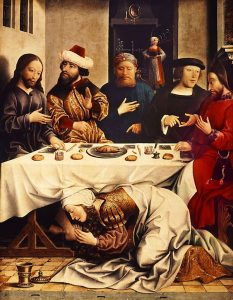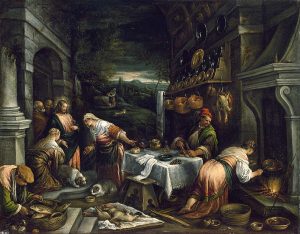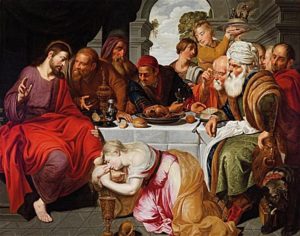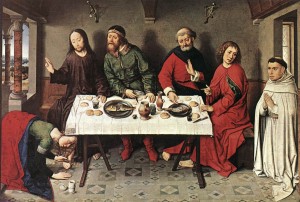Thoughts on Sunday’s Lessons for April 6, 2025 (Lent 5C)

Mary Magdalene anoints the feet of Jesus (early 16th century), oil painting on oak panel by the Master of the Legend of the Magdalene, possibly Jan Mostaert (c.1475–c.1552). Museum of Fine Arts, Budapest. (Click image to enlarge.)
First Reading: Isaiah 43:16-21
As Lent turns toward Palm Sunday and Holy Week, this Sunday’s readings direct our imagination toward seeking our goals with God’s help. In our first reading, the Prophet Isaiah remembers the time when the people were in exile in Babylon, defeated and hopeless, unable to get up: “extinguished, quenched like a wick.” Nevertheless, the prophet declares, “Do not remember the former things, or consider the things of old.” In God there is hope for new ways, Isaiah tells us. God will make a path in the wilderness and create rivers in the desert, protecting God’s people and bringing them home..
Psalm: Psalm 126
Psalm 126 echoes the feelings of hope that we heard in the Isaiah passage. The Psalmist envisions a future joyous day when all things old have been made new again. God will have restored Israel’s fortunes, filling the people with laughter and shouts of joy. Those who left the holy city weeping under burdens that seemed too great to bear now return with shouts of joy, bringing in a bountiful harvest.
Second Reading: Philippians 3:4b-14
Writing to the Christian community of Philippi, a Gentile community of retired Roman soldiers in Greece, Paul tells them how he had been a zealous Pharisee, believing that he had much to be proud of. He had felt strong in his faith as he angrily persecuted Christians, regarding them as dangerous radicals. But then, he says, he discovered Jesus and everything changed: In words consistent with the reading from Isaiah, he urges the people to press on, as he does, toward the goal of resurrection and life.
Gospel: Gospel: John 12:1-8
To grasp the powerful context of this familiar narrative, re-read John’s verses just before and just after the story of Mary weeping as she anoints Jesus’s feet with expensive perfume. Jesus has just raised Lazarus from the dead, causing such an uproar that the chief priests and Pharisees decided to kill Jesus to keep the Romans from stepping in. Just after these verses, the temple authorities decide to kill Lazarus, too, because his miraculous return from the dead is inspiring people to follow Jesus. Jesus is at risk of death. He warns his friends that they won’t always have him with them. But don’t mistake the meaning of Jesus’s words, “You always have the poor with you.” This is not an argument against helping the poor. On the contrary, it is a direct quote from Torah, God’s explicit commandment that we must always open our hands to the poor and needy neighbors in our land.




